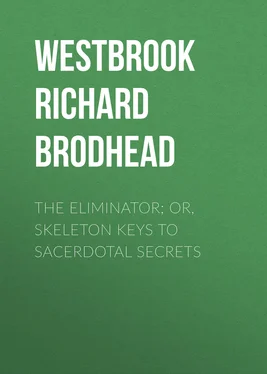Richard Westbrook - The Eliminator; or, Skeleton Keys to Sacerdotal Secrets
Здесь есть возможность читать онлайн «Richard Westbrook - The Eliminator; or, Skeleton Keys to Sacerdotal Secrets» — ознакомительный отрывок электронной книги совершенно бесплатно, а после прочтения отрывка купить полную версию. В некоторых случаях можно слушать аудио, скачать через торрент в формате fb2 и присутствует краткое содержание. Жанр: foreign_prose, foreign_religion, Философия, foreign_psychology, foreign_antique, на английском языке. Описание произведения, (предисловие) а так же отзывы посетителей доступны на портале библиотеки ЛибКат.
- Название:The Eliminator; or, Skeleton Keys to Sacerdotal Secrets
- Автор:
- Жанр:
- Год:неизвестен
- ISBN:нет данных
- Рейтинг книги:3 / 5. Голосов: 1
-
Избранное:Добавить в избранное
- Отзывы:
-
Ваша оценка:
- 60
- 1
- 2
- 3
- 4
- 5
The Eliminator; or, Skeleton Keys to Sacerdotal Secrets: краткое содержание, описание и аннотация
Предлагаем к чтению аннотацию, описание, краткое содержание или предисловие (зависит от того, что написал сам автор книги «The Eliminator; or, Skeleton Keys to Sacerdotal Secrets»). Если вы не нашли необходимую информацию о книге — напишите в комментариях, мы постараемся отыскать её.
The Eliminator; or, Skeleton Keys to Sacerdotal Secrets — читать онлайн ознакомительный отрывок
Ниже представлен текст книги, разбитый по страницам. Система сохранения места последней прочитанной страницы, позволяет с удобством читать онлайн бесплатно книгу «The Eliminator; or, Skeleton Keys to Sacerdotal Secrets», без необходимости каждый раз заново искать на чём Вы остановились. Поставьте закладку, и сможете в любой момент перейти на страницу, на которой закончили чтение.
Интервал:
Закладка:
Renan also writes thus: “All the symbols which serve to give shape to the religious sentiment are imperfect, and their fate is to be one after another rejected. But nothing is more remote from the truth than the dream of those who seek to imagine a perfected humanity without religion.”… “Devotion is as natural as egoism to a true-born man. The organization of devotion is religion. Let no one hope, therefore, to dispense with religion or religious associations. Each progression of modern society will render this want more imperious.”
We use the word religion as it was used by Cicero, in the sense of scruple , implying the consciousness of a natural obligation wholly irrespective of what one may believe concerning the gods. Religion in its true meaning is the great fact of duty, of oughtness , consisting in an honest and persistent effort to realize ideal excellence and to transform it into actual character and practical life. Religion as a spirit and a life is objected to by none, but is admired and commended by all. It is superstition, bigotry, credulity, and dogma that are detestable. The religious instinct has been perverted, turned into wrong channels, made subservient to priestcraft and kingcraft, but its basic principle remains for ever firm. If it could have been destroyed, the machinations of priests would have annihilated it long ago. Give yourselves no anxiety about the corner-stone of religion, but look well to the rotten superstructures that have been reared upon it. Its professed friends are often its real enemies. It is the false prophet who is afraid to have his oracles subjected to tests of reason and history. It is the evil-doer who is afraid of the light, the conscious thief who objects to being searched. An honest man would say, “Let the truth be published, though the heavens fell.”
The whole truth should be published, as a matter of common honesty, if nothing more. We have no moral right to conceal the truth, any more than we have to proclaim falsehood. He who deliberately does the one will not hesitate long about doing the other. And this is one of the most serious aspects of this subject. He who can bring himself to practise deceit regarding religion will soon be a villain at heart, even if worldly prudence is strong enough to keep him out of the penitentiary.
As a rule, the unfaithful teacher inflicts a greater evil upon his own soul than upon his unsuspecting dupe. The deceiver is sure to be overtaken by his own deceit. Mean men become more mean, and liars come to believe their own oft-repeated falsehoods. This principle may in part account for the fact that in all ages dishonest, mercenary, designing priests have been most corrupt citizens and ready tools in the hands of tyrants to oppress and enslave the people.
Every deceptive act blunts the moral sense, defiles and sears the conscience, until at last the hypocrite degenerates into a slimy, subtle human serpent that always crawls upon its belly and eats dust. Secretiveness and deceitfulness become a second nature, and show themselves continually even in the ordinary affairs of life. The reflex influence of deception upon the deceiver himself is its most bitter condemnation.
But modern preachers have a way of justifying their evasions and prevarications by saying that even Jesus himself withheld from his own disciples some things, for the reason that they were “not able to bear them,” quite overlooking the fact that he is also reported to have said, “When the Spirit of truth has come, he will teach you all things,” and that other passage (Luke 12: 2), where Jesus is represented as saying, “For there is nothing covered that shall not be revealed, neither hid that shall not be known. Therefore, whatsoever ye have spoken in darkness, shall be heard in the light, and that which ye have spoken in the ear, in closets, shall be proclaimed upon the housetops.”
If after eighteen hundred years of Christian teaching the time has not yet come to proclaim the whole truth, it is not likely to come for many ages in the future. If religion is a mystery too great to be comprehended, too sacred for reverent but untrammelled investigation, something that can only exist with a blind, unreasoning credulity and the utter stultification of the natural faculties of a true manhood, then religion is not worth what it costs and should be exposed as a delusion and a snare.
The time for the religious Kabala has passed, and ambiguities, concealments, and evasions are no longer to be tolerated. Martin Luther builded better than he knew when he proclaimed the right of private judgment in matters of religion. It has taken two hundred years for this fundamental principle to become thoroughly accepted by the people; but so firmly is it now established that bigoted ecclesiastics might as well attempt to resist the trend of an earthquake, stop the rising of the sun, and turn the light of noonday into the darkness of midnight as to attempt to arrest the progress of a true religious rationalism. The mad ravings of fanatics will have no more influence than the pope’s bull had on the comet. Learning is no longer monopolized by a few monks and ministers. For every five clergymen who are abreast with the times, the progress of modern thought, and the conclusions of science, there are fifty laymen who are familiar with the writings of Humboldt, Darwin, Huxley, Spencer, Tyndall, and scores of other scientists, to whom the world is more indebted for true progress than to all the lazy monks and muttering priests who have lived since the world began. The fact is, the old delusion that men must look to the sacerdotal class exclusively, or even mainly, for religious truth, has been for ever banished from the minds of intelligent men. The literature of the day is full of free thought and downright rationalism, and even the secular newspaper is a missionary of religious progress and reform, and brings stirring messages of intellectual progress every day to our breakfast-tables. The world moves, and those who attempt to stop it are sure to be crushed.
The pretence that anything is too sacred for investigation and publication will not stand the light of this wide-awake nineteenth century.
It is often said that the common people are not ready for the whole truth. In 1873, Dr. J. G. Holland, then editor of Scribner’s Monthly , wrote to Dr. Augustus Blauvelt declining to publish an article on “The Divine and Infallible Inspiration of the Bible,” and added, “I believe you are right. I should like to speak your words to the world; but if I do speak them it will pretty certainly cost me my connection with the magazine. This sacrifice I am willing to make if duty requires it. I am afraid of nothing but doing injury to the cause I love.... In short, you see that I sincerely doubt whether the Christian world is ready for this article.... Instead of the theologians the people would howl.... I cannot yet carry my audience in such a revolution. Perhaps I shall be able to do so by and by, but as I look at it to-day it seems impossible.... My dear friend, I believe in you. You are in advance of your time. You have great benefits in your hands for your time. You are free and true. And I mourn sadly and in genuine distress that I cannot speak your words with a tongue which all my fellow-Christians can hear. They will not hear them yet. They will some time....”
Dr. Holland has passed away and cannot reply to criticism. Let us be kind and charitable. He intended to be right, but he was mistaken. The people do not howl when the truth is published, even though their prejudices may be aroused; and no tedious preparation is now necessary to be able to hear the whole truth. The masses of the people are hungry for knowledge, and it is high time that they be honestly fed. They now more than half suspect that they have been deceived by those some of whom they have educated by their charities and liberally paid to teach them the truth. When, in 1875, Scribner’s Monthly did publish Dr. Blauvelt’s articles on “Modern Skepticism,” it was not the people that “howled.” It was the clergy. Some of them demanded a new editor; others warned the people from the pulpit not to patronize Scribner ; and one distinguished man declared that the magazine must be “stamped out,” and at once organized a most powerful ecclesiastical combination against the freedom of the press; and yet the North American Review and other similar magazines are today doing more to settle long-mooted religious questions than all the pulpits in Christendom; and the people do not howl. No respectable enterprising publisher now hesitates to publish a book of real merit, however much its doctrines may differ from the dominant faiths. The masses of the people are determined to know all that can be known of the history, philosophy, and principles of religion; and the greater the effort to conceal and suppress the truth the stronger will be the demand for its full and undisguised proclamation.
Читать дальшеИнтервал:
Закладка:
Похожие книги на «The Eliminator; or, Skeleton Keys to Sacerdotal Secrets»
Представляем Вашему вниманию похожие книги на «The Eliminator; or, Skeleton Keys to Sacerdotal Secrets» списком для выбора. Мы отобрали схожую по названию и смыслу литературу в надежде предоставить читателям больше вариантов отыскать новые, интересные, ещё непрочитанные произведения.
Обсуждение, отзывы о книге «The Eliminator; or, Skeleton Keys to Sacerdotal Secrets» и просто собственные мнения читателей. Оставьте ваши комментарии, напишите, что Вы думаете о произведении, его смысле или главных героях. Укажите что конкретно понравилось, а что нет, и почему Вы так считаете.












